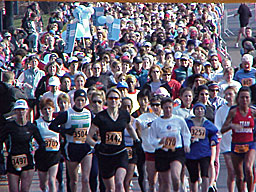Keep focused on your programme; Your physical fitness at this moment is the sum of your training and nutrition practices over the past 5-6 months leading up to this event. Do your best to stay with these inputs to which your body already adapted.
Concentrate on consuming adequate fluids; Marathon hydration is essential, especially three days before competition (e.g. 2-3 litres a day).
 Do not experiment with new foods; Stay with foods that you are familiar with; if it has not been part of your regular daily nutrition chances are it will do more harm than good.
Do not experiment with new foods; Stay with foods that you are familiar with; if it has not been part of your regular daily nutrition chances are it will do more harm than good.
Achieve high muscle and liver glycogen; By tapering training over the next 3 days and consuming a high intake of carbohydrates, you can achieve a high muscle and liver glycogen content at the time of your marathon. Fuel your muscles to go the distance.
Extra rest; Extra rest and a high carbohydrate intake over the final 3-4 days will enhance performance. Taking a couple of days off before the race will benefit you greatly. A good night’s sleep, two nights before the race is key!
Limit Alcohol; Alcohol intake can have a negative effect on performance and should be reduced or eliminated altogether in the week leading up to your race..
Night before – high carbohydrates; A high carbohydrate diet (e.g. pasta, potatoes, rice, noodles, cereals, juices) in combination with rest the day before your marathon can lead to high muscle glycogen levels and enhance your performance.
 Low glycaemic carbohydrates at breakfast; Overnight fasting reduces liver glycogen. Carbohydrates with low or moderate ratings on the glycaemic index (GI) are the preferred type of carbohydrate for consumption 3-5 hours before your marathon (e.g. oatmeal, porridge, banana, orange juice, grapes, whole meal bread, and yoghurt).
Low glycaemic carbohydrates at breakfast; Overnight fasting reduces liver glycogen. Carbohydrates with low or moderate ratings on the glycaemic index (GI) are the preferred type of carbohydrate for consumption 3-5 hours before your marathon (e.g. oatmeal, porridge, banana, orange juice, grapes, whole meal bread, and yoghurt).
Do not experiment with carbohydrates during the race; You may want to ingest a carbohydrate rich drink during your event. Keep in mind this should already be part of your training practices. Race day is not the time to try something new.
Drink right before marathon; Close to your marathon start time (15-20 minutes), you can drink 300-400 ml (2 cups) of fluid.
Just enough fluids during race; Keeping a comfortable volume of fluids in your stomach before, during, and after your marathon is essential to performance and recovery. Don’t pass up on any early water stations, especially the first 6 miles; you cannot make up for it in the later stages of your race.
Pace your nutrition; Just as your marathon is all about pace to maximise energy output so too is your nutrition – avoid over or under nourishment. Your body loses energy by trying to compensate for the imbalance.
Preparation is the key to success – have a great marathon!

